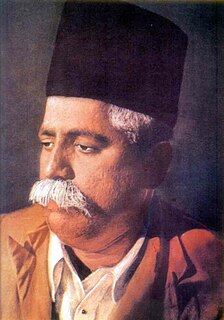Related Research Articles

The Rashtriya Swayamsevak Sangh, abbr.RSS, is an Indian right-wing, Hindu nationalist, paramilitary volunteer organisation. The RSS is the progenitor and leader of a large body of organisations called the Sangh Parivar, which have presence in all facets of the Indian society. RSS was founded on 27 September 1925. As of 2014, it has a membership of 5–6 million.
Hindutva (transl. Hinduness) is the predominant form of Hindu nationalism in India. As a political ideology, the term Hindutva was articulated by Vinayak Damodar Savarkar in 1923. It is championed by the Hindu Nationalist volunteer organisation Rashtriya Swayamsevak Sangh (RSS), the Vishva Hindu Parishad (VHP), the Bharatiya Janata Party (BJP) and other organisations, collectively called the Sangh Parivar.
Religious nationalism is the relationship of nationalism to a particular religious belief, dogma, or affiliation. This relationship can be broken down into two aspects: the politicisation of religion and the influence of religion on politics.
In the Indian context, the term pseudo-secularism is used to pejoratively describe policies considered to involve minority appeasement. The Hindus form the majority religious community in India; the term "pseudo-secular" implies that those who claim to be secular are actually not so, but are anti-Hindu or pro-minority. The Hindu nationalist politicians accused of being "communal" use it as a counter-accusation against their critics.

The Bharatiya Jana Sangh was an Indian right wing political party that existed from 1951 to 1977 and was the political arm of Rashtriya Swayamsevak Sangh (RSS), a Hindu nationalist volunteer organisation. In 1977, it merged with several other left, centre and right parties opposed to the Indian National Congress and formed the Janata Party. In 1980, Jana Sangh faction broke away from Janata Party over the issue of dual membership, and formed Bharatiya Janata Party.

The Bajrang Dal is a Hindu nationalist militant organisation that forms the youth wing of the Vishva Hindu Parishad (VHP). It is a member of the right-wing Sangh Parivar. The ideology of the organisation is based on Hindutva. It was founded on 1 October 1984 in Uttar Pradesh, and began spreading more in the 2010s throughout India, although its most significant base remains the northern and central portions of the country. The group runs about 2,500 akhadas, similar to the shakhas (branches) of the Rashtriya Swayamsevak Sangh. The name "Bajrang" is a reference to the Hindu deity Hanuman.
The Sangh Parivar refers, as an umbrella term, to the collection of Hindu nationalist organisations spawned by the Rashtriya Swayamsevak Sangh (RSS), which remain affiliated to it. These include the political party Bharatiya Janata Party, religious organisation Vishva Hindu Parishad, students union Akhil Bharatiya Vidyarthi Parishad (ABVP), religious militant organisation Bajrang Dal that forms the youth wing of the Vishva Hindu Parishad (VHP), and the worker's union Bharatiya Kishan Sangh. It is also often taken to include allied organisations such as the Shiv Sena, which share the ideology of the RSS. The Sangh Parivar represents the Hindu nationalist movement of India.

Keshav Baliram Hedgewar, also known by his moniker Doctorji, was an Indian Surgeon and the founding Sarsanghachalak of the Rashtriya Swayamsevak Sangh (RSS). Hedgewar founded the RSS in Nagpur in 1925, based on the ideology of Hindutva with the intention of creating a Hindu Rashtra.

Akhand Bharat, also known as Akhand Hindustan is an irredentist term literally meaning Undivided India. It posits that modern-day India, Pakistan, Afghanistan, Bangladesh, Nepal, Bhutan, Tibet, Sri Lanka and Burma are one nation.

Madhavrao Sadashivrao Golwalkar was the second Sarsanghchalak of the Rashtriya Swayamsevak Sangh (RSS). He has been widely noted to be the most prominent ideologue of Hindutva. He was known for his intellectual commentary on Indian politics and religion. Golwalkar is considered one of the most influential and prominent figures among Rashtriya Swayamsevak Sangh. He was not the first person to put forward the concept of a cultural nation called "Hindu Rashtra" which is believed to have evolved into the concept of the "Akhand Bharat Theory", united nations for Bharatiyas. Golwalkar was one of the early Hindu nationalist thinkers in India. Golwalkar authored the book We, or Our Nationhood Defined. Bunch of Thoughts is a compilation of his speeches.

The Hindu American Foundation is an American Hindu advocacy group founded in 2003. The organisation has its roots in the Hindu nationalist organisation Vishwa Hindu Parishad America and its student wing Hindu Students Council. According to its critics, the HAF has repackaged the Hindu nationalist agenda in the language of "Hindu rights" in a way to suit mainstream American politics.

Hindu Swayamsevak Sangh is a sister organization to Rashtriya Swayamsevak Sangh (RSS) for supporting and mobilising Hindus living outside India. It was founded in 1940s in Kenya, it is currently active in 156 countries and boasts 3289 branches.
Walter K. Andersen is an American academic known for his studies of the Rashtriya Swayamsevak Sangh (RSS) – a Hindu nationalist organization. He currently serves as Senior Adjunct Professor of South Asia Studies at Johns Hopkins University Paul H. Nitze School of Advanced International Studies and is a part of the faculty of Tongji University, Shanghai (China). Previously, he taught comparative politics at the College of Wooster before joining the United States State Department as a political analyst for South Asia specializing in India and Indian Ocean affairs. Additionally, he was an adjunct professor at The American University in Washington, D.C.
Voice of India (VOI) is a publishing house based in New Delhi, India, that specialises in Hindu nationalist books and serves as one of the most important tools in the development of Hindutva ideologies.

Madhukar Dattatraya Deoras, popularly known as Balasaheb Deoras, was the third Sarsanghchalak of the Rashtriya Swayamsevak Sangh (RSS).

The Rashtra Sevika Samiti is a Hindu nationalist women's organisation that parallels the Rashtriya Swayamsevak Sangh (RSS) for men. Even though it is often referred to as the " Sister" of the RSS, the organisation claims that it is independent of the RSS while sharing its ideology. Membership and leadership is restricted to women and its activities are directed to nationalist devotion and mobilisation of Hindu women.

Anti-Christian violence in India is religiously-motivated violence against Christians in India. Violence against Christians has been seen by Human Rights Watch as a tactic used by the right-wing Sangh Parivar organizations to encourage and exploit communal violence to meet their political ends. The acts of violence include arson of churches, conversion of Christians by force, physical violence, sexual assaults, murders, rapes, and destruction of Christian schools, colleges, and cemeteries.
The Bharatiya Kisan Sangh (BKS) is an Indian farmers' organization that is politically linked to the Rashtriya Swayamsevak Sangh, and a member of the Sangh Parivar. BKS was founded by Dattopant Thengadi in 1978. As of 2000, Rashtriya Swayamsevak Sangh claimed BKS had a quarter million members, organized in 11,000 villages and 301 districts across the country. The organization is dominated by landed gentry.

Deendayal Upadhyaya was an Indian politician and thinker of right-wing Hindutva ideology espoused by the Rashtriya Swayamsevak Sangh (RSS), and leader of the political party Bharatiya Jana Sangh (BJS), the forerunner of Bharatiya Janata Party (BJP). He was also known as Panditji for appearing in the civil services examination hall wearing the traditional Indian dhoti-kurta and cap.
Hindu nationalism has been collectively referred to as the expression of social and political thought, based on the native spiritual and cultural traditions of the Indian subcontinent. Defenders of Hindu nationalism have tried to avoid the label "nationalism" by arguing that the use of the term "Hindu nationalism" to refer to Hindū rāṣṭravāda is a simplistic translation and is better described by the term "Hindu polity".
References
- ↑ CK, Faisal (17 April 2019). "Reclaiming the Congress ideology is essential to beat Fascist forces". National Herald.
- ↑ Andersen, Walter; Damle, Shridhar D. (15 June 2019). Messengers of Hindu Nationalism: How the RSS Reshaped India. Oxford University Press. ISBN 978-1-78738-288-6.
- ↑ Pinkney, Andrea Marion; Whalen-Bridge, John (20 August 2018). Religious Journeys in India: Pilgrims, Tourists, and Travelers. SUNY Press. ISBN 978-1-4384-6603-3.
- ↑ Rao, Shakuntala (24 December 2018). Indian Journalism in a New Era: Changes, Challenges, and Perspectives. Oxford University Press. ISBN 978-0-19-909761-6.
- ↑ Robert Eric Frykenberg, "Gospel, Globalization, and Hinduvta: The Politics of 'Conversion' in India", in Donald M. Lewis, Christianity Reborn: The Global Expansion of Evangelicalism in the Twentieth Century, (Eerdmans, 2004), p. 108.
- ↑ Chopra, Rohit (2008). Technology and Nationalism in India: Cultural Negotiations from Colonialism to Cyberspace. Cambria Press. ISBN 978-1-60497-567-3.
- ↑ Premawardhana, Shanta (17 August 2015). Religious Conversion: Religion Scholars Thinking Together. John Wiley & Sons. ISBN 978-1-118-97238-0.